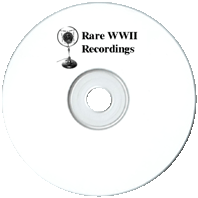

Network Radio not only came of age during the Second World War, but it also helped to bring the Nation together to achieve Final Victory.

83 old time radio show recordings
(total playtime 21 hours, 14 min)
available in the following formats:
1 MP3 CD
or
22 Audio CDs
Text on OTRCAT.com ©2001-2025 OTRCAT INC All Rights Reserved. Reproduction is prohibited.
The First World War, "The Great War", was sold to the American People as "The War to End All Wars". It did not. In fact, many historians theorize that the Second World War was an inevitable continuation of the Great War. WWI introduced the horrors of industrialized warfare to mankind, and by the end of the later conflict, mankind was on the verge of developing technologies capable of ending all life on the planet.

When the War began in Europe, America had nearly recovered from the Great Depression and just supplying arms to the European combatants further boosted the economy. Manufacturing and shipping War Materiel for American Boys in the fight became an unstoppable economic juggernaut.
The United States' success in the War owes a great debt to the Entertainment Industry. Propaganda was important to all the belligerent nations in the conflict, and although history paints the Propaganda efforts of the Nazis as particularly atrocious, the simple fact is that the free-enterprise system of Hollywood created more effective propaganda in greater amounts than the state-directed efforts of the Fascists.
During the Great Depression, commercial radio matured from an entertainment curiosity to an important part of almost every household. Because of the Networks, everyone from Bangor, Maine, to San Diego, California, from Miami to Seattle, was hearing the same news at about the same time. If the War helped the unite America, radio became the glue that held it together.
The War was everywhere on the Radio. The news broadcasts kept the Nation informed about what was going on overseas, and almost every entertainer in Hollywood pitched War Bonds at one time or another to help pay for the War. The romantic male character in many Soap Operas would answer the call to serve, resulting in various degrees of tragedy, depending on the Soap in question. Comics in situation comedies learned important lessons about rationing which reinforced the discussions heard on panel programs. Comics hosting Variety Programs took their shows directly to the troops with Camp Shows, which may have been a technical and logistical challenge but never harmed a show's ratings.
The Radio Industry fulfilled its obligation to serve the public interest during the War, and existing broadcasts from the time, including the rare episodes included in this collection, are historical artifacts which should not only be studied and preserved but enjoyed for their intrinsic entertainment value.










Text on OTRCAT.com ©2001-2025 OTRCAT INC All Rights Reserved. Reproduction is prohibited.
You have reached the maximum number of votes for a unregistered user.
Please login or create a new account to continue...
You have reached the maximum number to down votes in this page.



Rare WWII Disc A001
|
Add Audio CD to Cart - $5.00 |
Rare WWII Disc A002
|
Add Audio CD to Cart - $5.00 |
Rare WWII Disc A003
|
Add Audio CD to Cart - $5.00 |
Rare WWII Disc A004
|
Add Audio CD to Cart - $5.00 |
Rare WWII Disc A005
|
Add Audio CD to Cart - $5.00 |
Rare WWII Disc A006
|
Add Audio CD to Cart - $5.00 |
Rare WWII Disc A007
|
Add Audio CD to Cart - $5.00 |
Rare WWII Disc A008
|
Add Audio CD to Cart - $5.00 |
Rare WWII Disc A009
|
Add Audio CD to Cart - $5.00 |
Rare WWII Disc A010
|
Add Audio CD to Cart - $5.00 |
Rare WWII Disc A011
|
Add Audio CD to Cart - $5.00 |
Rare WWII Disc A012
|
Add Audio CD to Cart - $5.00 |
Rare WWII Disc A013
|
Add Audio CD to Cart - $5.00 |
Rare WWII Disc A014
|
Add Audio CD to Cart - $5.00 |
Rare WWII Disc A015
|
Add Audio CD to Cart - $5.00 |
Rare WWII Disc A016
|
Add Audio CD to Cart - $5.00 |
Rare WWII Disc A017
|
Add Audio CD to Cart - $5.00 |
Rare WWII Disc A018
|
Add Audio CD to Cart - $5.00 |
Rare WWII Disc A019
|
Add Audio CD to Cart - $5.00 |
Rare WWII Disc A020
|
Add Audio CD to Cart - $5.00 |
Rare WWII Disc A021
|
Add Audio CD to Cart - $5.00 |
Rare WWII Disc A022
|
Add Audio CD to Cart - $5.00 |
Please wait...
COMMENTS
Les Verified Purchase
Kurt
Leave a comment